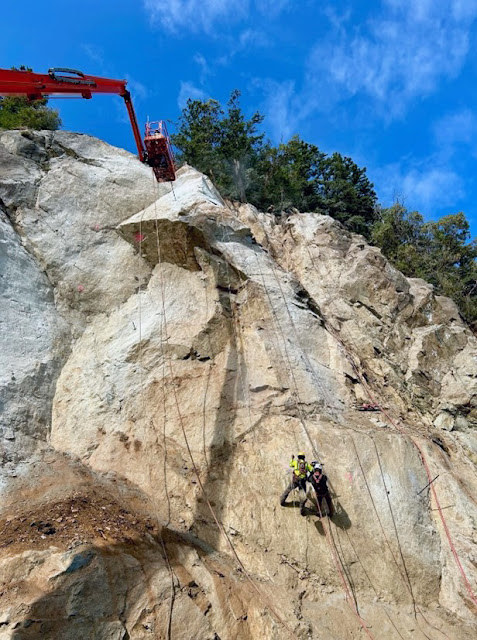By RB McKeon
When a rockslide landed across State Route 11/Chuckanut Drive just south of Bellingham on April 22, it brought down thousands of tons of debris and left a huge boulder hanging on the slope above the highway.
In the weeks that followed, crews worked to remove unstable rock, anchor the slope and clear the roadway. After 58 days, Chuckanut Drive is open again, and we’re sharing what it took to reopen this iconic route.
 |
| A drone photo taken in early May shows the magnitude of the slide stretching 150 feet long and 30 feet deep. |
An iconic road in a geologically complex area
Chuckanut Drive winds between the forested cliffs of the Chuckanut Mountains and the shoreline of Samish Bay. The views are stunning and the geology is just as dramatic. The road is carved into steep, rocky slopes made of old, fractured rock that naturally shifts and breaks over time. This mix of beauty and instability makes it one of the most scenic and challenging roads in Washington and one that is prone to rock slides. This slide, however, was the largest in recent memory, measuring 150 feet long and 30 feet deep.
Behind the scenes with WSDOT engineering geologists
Before crews could fix the road, they had to deal with what was still hanging above it. That’s where scaling comes in.
Scaling means removing loose or dangerous rock from a slope. Specialized crews do this by hand while hanging from ropes generally working from the top of the slope to the base of the slope to minimize risk of rocks falling on them from above. They use pry bars, special tools and air-powered pillows to gently push apart cracked rocks.
Safety is always the top priority. Crews worked slowly and carefully to make sure loose rock didn’t fall onto the active railroad below. This process required close coordination and constant communication.
WSDOT’s engineering geologists played a key role. These experts study how soil, rock, vegetation and water interact with roads, bridges, and rock slopes such as these.
 |
| Two crew members repel down the SR 11 rock slope to drill reinforcement holes at anchor points to stabilize potentially unstable blocks. |
On Chuckanut Drive, WSDOT Engineering Geologists climbed the slope to inspect cracks and areas of potential concern. They used those findings to design a plan to secure the slope. This included drilling deep holes and installing threaded metal bars to help hold the rock in place. Their work happens behind the scenes, but it’s critical to keeping roads like SR 11 safe.
While WSDOT led the technical assessment and oversight, the hands-on work was completed by a contractor brought on through an emergency contract. These specialized crews handled the scaling, drilling, and heavy lifting needed to carry out the geotechnical team’s plan.
From classroom to cliffside
While work was underway, WSDOT also hosted 14 civil engineering graduate students from the University of Washington. These future engineers got a close-up look at how slope repair happens in the real world.
 |
| WSDOT’s State Engineering Geologist Marc Fish and Engineering Geologist Stephen Newman speaking with UW civil engineering graduate students who spent a day on-site with crews. |
WSDOT staff showed them the tools, techniques, and thinking behind every step from scaling to anchor drilling. Their professor later wrote:
“Seeing the practical application of the theoretical concepts we've been covering has significantly enhanced their understanding. They left the field trip with an enhanced interest in the agency.”
Experiences like this help students connect classroom learning to future careers.
Making the most of the closure
While most of the work focused on the big slide near the Oyster Dome trailhead, crews also used the full closure to tackle another problem slope a few miles north near milepost 13. A smaller slide had occurred there in November 2024.
Crews removed loose rock and stabilized that slope using the same scaling techniques employed at the southern location. No drilling or anchors were required at this location as determined by the engineering geologists. By combining both efforts into one response, WSDOT saved time and reduced the need for a future closure.
Closed for a reason
 |
| Pink and white spray paint marks rock that have to be reinforced with reinforcing bars before SR 11 could be reopened. |
Chuckanut Drive is beautiful, and the work was visually dramatic. But during the closure, some people tried to go past the road-closed signs. That’s never safe.
This was an unstable slope with tons of loose rock and large equipment in operation. Even when crews weren’t onsite, there was still danger. Road closures protect both workers and the public.
Thanks to everyone who followed the detours and gave crews the space they needed to do their work safely.
A job worth applauding
A big thank you goes to the residents, local businesses, and their patrons who showed patience and flexibility during this emergency work. Your support made it easier to complete repair efficiently.
SR 11 is now open. And while it may not be a Hollywood movie, we think this story deserves a standing ovation.
 |
| A screenshot of staff from an area business standing with WSDOT crews as the road was reopened on June 19. |
No comments:
WSDOT comment policy
Post a Comment